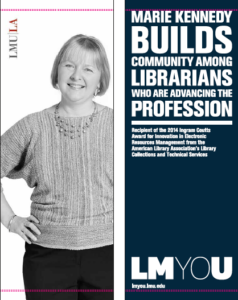In a confusing turn of events, there’s an editorial scheduled for the next issue (pre-print is available now) of a well-known library journal, the Journal of Academic Librarianship, about why practicing librarians can’t do research. It’s confusing because it leads off an issue that’s full of research articles written by practicing librarians. It’s also confusing because the piece is written by the editor herself, Elizabeth Blakesley.
When I saw the piece pop up in my RSS reader I read it right away. It is titled, “The Constraints of Practice, or We Work in Libraries, That’s Why We Can’t Do Research.” As the co-director of the Institute for Research Design in Librarianship (IRDL) I am familiar with the barriers that librarians may face when conducting research and was prepared to nod my head in affirmation at the perceived challenges this editor must have observed in her practice. Instead I was left shaking my head in disbelief that somebody in a position as editor and senior library administrator would publish such a thing.
To get a copy of the one-page editorial it will cost you $45 if you’re not a subscriber, so I won’t link to it here. I’ll highlight some of the things that stood out to me as I read through it. The editorial is six paragraphs long.
1. In the first of six paragraphs Ms. Blakesley nods to Wayne Wiegand’s 2016 Inside Higher Ed piece about how the “issues of reading and library as place have been just as important as others, but that none of the professional library education programs cover it.”
2. In the second paragraph Ms. Blakesley laments about the LIS research community, “I’m afraid that we don’t really exist.” She notes that “librarians are by and large practitioners.” In her opinion, choosing to pursue a PhD in LIS is not an advantage because “Jobs teaching in I-Schools were never all that plentiful, considering how few there were, and programs have shrunk over the years, as adjunct faculty have been increasingly hired to handle teaching LS courses, more LS curriculum is taught online, and programs have outright closed.”
3. In the third paragraph Ms. Blakesley writes that those with master’s degrees in library science who have positions in academic libraries have “wacky job titles like ‘Professor of Library Science’ because someone is trying to make us look equivalent to those professors of sociology, chemistry or English.” She notes that we write articles in order to get tenure and keep our jobs but that our training was about “rules and processes and sources.”
4. In the fourth paragraph Ms. Blakesley comments that as an administrator she feels that she often does not have complete enough information to know her library patrons (“throwing darts at a board”), but those libraries that do have that information have achieved it by obtaining budgets to hire anthropologists.
5. In the fifth paragraph Ms. Blakesley notes that “one of the most frustrating things is usage data.”
6. In the closing paragraph Ms. Blakesley comments that “it breaks my heart to see us make the same blunders again and again, just with new technologies wearing the dunce cap. As a library administrator, it breaks my heart that we still don’t have the tools we need to fully equip our services, assess ourselves and succeed completely.”
We know that academic and research librarians and their institutions derive well-established benefits from librarians conducting research: progress toward gaining promotion, tenure, and higher salaries; advancement in the profession and recognition; receptivity to change; increased skill in managing complex library operations through systematic study; and better service to and empathy with faculty researchers (Black & Leysen, 1994; Montanelli & Stenstrom, 1986). We also know that practicing librarians are conducting research, despite barriers (see http://irdlonline.org/project-info/irdl-scholar-works-completed/ for some great examples of recent work by IRDL Scholars). It seems, therefore, an affront to all we know about how practicing librarians are actually improving the profession to have a significant journal in our field led by someone with this defeatist attitude.






























